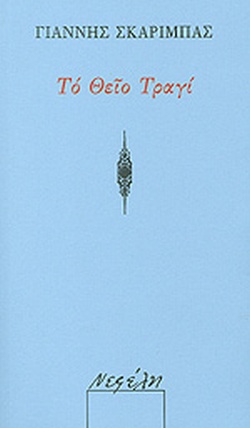ΤΟ ΘΕΙΟ ΤΡΑΓΙ / THE DIVINE TRAGI (male goat)
 “>
“>
Author:
ΥANNIS SKARIMBAS
Country:
Greece (GR)
Book Theme:
Classic novels and Authors representing your country culture
Publisher:
NEFELI
Publishing Year:
1993
Yannis Skarimbas was a Greek writer, poet, and playwright known for his avant-garde style and defiance of literary norms. Born in Agia Efthymia, Phocis, he later settled in Halkida, where he worked as a customs officer. Skarimbas was a pioneer of modernist and surrealist literature in Greece, blending humor, irony, and existential themes in his works. His novel Divine Tragi (1933) is considered a landmark of Greek literature, challenging bourgeois values and conventional storytelling. He also wrote poetry, essays, and theatrical plays, leaving a distinct mark on 20th-century Greek letters with his innovative and rebellious spirit.
National Award for Children’s and Young People’s
Abstract
Divine Tragi (Θείο Τραγί), published in 1933, is a seminal work by Greek author Yannis Skarimbas. The novel is celebrated for its avant-garde narrative and its challenge to conventional storytelling. Set in the provincial town of Halkida, the story follows an unconventional protagonist who defies societal norms, embodying the author’s critique of bourgeois values and the constraints of traditional society. Skarimbas employs a unique narrative style, blending surrealism with sharp social commentary, which has positioned Divine Tragi as a cornerstone of modern Greek literature.
The hero, named John – the author’s namesake – consciously chose the role of the wandering bum, despite the education he seems to possess. After many wanderings, he returns from his native land as a traveller, meets his sister and then stays for some time in the mansion where an old unrequited love lives, now married. The insightful eye of the narrator John is involved in everyday life, giving us moments of insight into the human condition. When the time comes to depart, he unexpectedly leaves behind a new life and walks towards his own path of desire and choice. He is a passer-by, a photograph of the ephemeral that takes shape in its passing, destined to be forgotten by people, who each time continue their lives, rejecting the transitory and the pivotal in favour of the fixed, the ordinary, the predictable, from the position in which each one finds himself.
It is about an anti-hero who goes from place to place, refusing society and its conventions, wanting to convince the reader of his black soul, and who in the end risks being won over by the kindness of some of his fellow men by the order of angels. But his real aim is to ‘shake’ established values, to emphasize their ‘ostensible’, their limits and construction.
From the presentation on the back cover of the book:
Written in 1931 and published at the beginning of 1933, “Divine Tragi” constitutes the starting point of Yannis Skarimba’s modern writing, since it contains, in a preliminary stage, most of the elements that will evolve and constitute the particular characteristics of the author’s writing. […] Today, sixty years after its birth, “Divine Tragi” is still a modern novel, because of its narrative technique and its anarchic writing, but above all because of its peculiar protagonist, who is very much related to the type of hero that sprang up in America, thirty years later, from the Beats movement. […]



